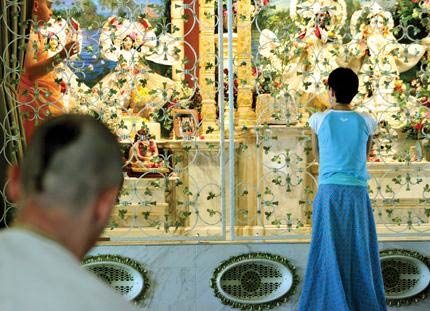More to Krishnas than Vegetarian Lunch
By Katie Gallagher | Apr 22, 2008

Hundreds of students find their way to the Plaza of the Americas every weekday to eat a $4 vegetarian meal served by the Hare Krishnas.
Some are interested enough to pick up a book off the self-service rack. A few attend classes on yoga or meditation at the Hare Krishna House on Northwest 14th Street.
But to casual diners, the history and philosophy of the Hare Krishnas who serve them lunch remains a mystery.
Building Foundations
The first Krishna follower came to Gainesville in the fall of 1970, said Parama Lieberman, a Krishna who has documented the group’s history. The Krishna movement had only just come to the United States from India in 1966.
That follower, named Gargamuni, chanted on the Plaza each day, sharing food and information with anyone who was curious.
Eventually, two interested UF students, David and Adrienne Lieberman – Parama’s parents – started practicing and offered Gargamuni use of their home in the student ghetto.
"Basically they made their little duplex a temple," Parama Lieberman said. "The first temple in Gainesville."
Krishnas began serving food out of the house, and when lunchtime crowds grew to about 70 people a day, they decided to take the food to the Plaza.
They continued to serve there until the late 1970s, when the university ordered the Krishnas to comply with certain health codes, which the Krishnas said were impossible.
When Parama’s father continued to serve the food, he was arrested.
But the case against the Krishnas didn’t hold up in court, said Kalakantha Das, the current president of the Gainesville Krishna House.
"The judge said, ‘Let the Krishnas have their picnic,’" Kalakantha said. "It’s part of our religious expression."
In 1977, land was purchased in the city of Alachua by Gainesville Krishnas with the idea of creating a sustainable agrarian community, said Chaturatma, president of the Krishna temple there.
Today, Gainesville’s Krishna population is small compared to the 750-person Alachua compound.
As Krishnas married and started families in the 1980s, the focus of the compound changed from farming to education. The community is now centered around a temple and two schools – a Krishna day school and an Alachua County charter school staffed mostly by Krishnas.
Following Krishna
Though food is spiritually important for Krishnas, there’s more to their religion than eating lentil soup and subji.
All devotees chant Krishna’s name many times a day as meditation, Kalakantha said.
In addition, Krishnas are vegetarians and practice celibacy until marriage.
They believe in karma, and remain free from intoxicants – including caffeine, alcohol and material possessions.
Each Sunday, local Krishnas gather at the temple in Alachua, a bright, tiled room with open glass doors along either side.
They start by performing arotik, a service in which they make offerings to Krishna of fruit, flowers and incense.
Congregants bring up offerings and place them in a basket before nine glittering statues of Krishna and his companion, Radha, as women in saris and men in loose robes dance barefoot, chant and beat on drums.
The service is followed by a lesson on the Bhagavad-Gita, the Krishnas’ holy book, and prasadam, a shared outdoor meal similar to the one on the Plaza.
On holy days, the temple in Alachua serves people from as far away as Jacksonville and Orlando, Chaturatma said.
People travel from all over the country to be a part of the Alachua community, he said. Members come from about 15 nationalities and speak about seven languages.
"The traditional sense of being a Krishna is give up everything, move into a temple, and that was your life," Chaturatma said.
Now, he said, Krishnas pursue careers as doctors or lawyers, he said.
Lieberman’s father, still a Hare Krishna, now works as a First Amendment lawyer in California.
"That guy that delivers your UPS package could very well be a Hare Krishna guy," Chaturatma said.
Developing Relationships
Eating lunch on the Plaza is the first place many devotees started to explore Krishnaism, as it was for Andres Salim, a UF biology junior.
Now a follower for more than two years, Salim was looking for religion.
"I think I’m the classic UF student, to be honest," he said. "I was fine, but you start to realize there’s more than just studying all the time and partying all the time. There’s no peace in that."
Salim’s family was open-minded about his choice, he said, but not everyone is.
Trey Rapczak, a Gainesville resident, said his mother wasn’t pleased when he became interested in Krishnaism a year and a half ago.
She finally kicked him out after one argument too many.
"I was supposed to clean my house," Rapczak said, "but for hours, I was offering things up to Krishna."
But Rapczak said he doesn’t regret his decision.
"Some people are like, ‘I need a cigarette,’" he said. "I’m like, ‘I need to chant more rounds.’"
But before he became a devotee, Rapczak said he had small hesitation. "Right before I started chanting, I was like, ‘Oh, what will everyone think?’" he said.
People’s reactions to Krishnas are not always positive.
Lieberman said that while chanting on the corner of 13th Street and University Avenue, he’s received foul words and hand gestures. But the Gainesville area, as a whole, he said, has been welcoming.
"When I would walk around at least the student area in my robes, I’d never get any negative remark," he said.
The good relationship Krishnas have with the Gainesville community probably has something to do with the food they’ve distributed there for so long, he said.
But Chaturatma said he sees something more spiritual at work. According to Krishna teaching, he said, certain places are home to unusually large pockets of positive energy.
"My guess is that something like that exists in Gainesville," he said. "Otherwise you’d say, ‘Why here?’"














